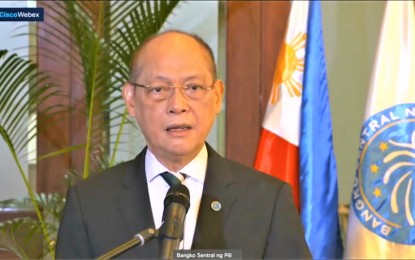
BSP Governor Benjamin Diokno
MANILA – The launch of more deposit account and electronic money (e-money) products helps the Bangko Sentral ng Pilipinas (BSP) achieve its goal to have 70 percent of Filipino adults part of the formal financial system by 2023.
“At the rate we’re moving and with the strong push by the government and the private sector, there is a strong likelihood that we’re going to get our target to onboard 70 percent of adult Filipinos by 2023 sooner rather than later,” BSP Governor Benjamin Diokno said in a virtual briefing on Wednesday.
Diokno said monetary authorities estimate that from 2020 until the third quarter of 2021, about 20 million unbanked Filipino adults have been included in the formal financial system through the opening of basic deposit accounts (BDA) and active e-money accounts.
He said these additional numbers brought the banked adult Filipinos to 41 million, or about 53 percent of the total adult Filipinos to date.
“We’re also optimistic that the result of the 2021 financial inclusion survey will validate the significant growth in ownership in the last two years,” he added.
Diokno said the launch of the updated national strategy for financial inclusion “solidifies the government’s commitment to achieving not only (the) account ownership target but broader financial inclusion objectives.”
He said the National Strategy for Financial Inclusion (NSFI) 2022-2028 recognizes as among the challenges in adding more adult Filipinos in the formal financial system, the economic, physical, and behavioral issues on financial conditions.
The updated NSFI provides the framework for a broad-based growth and financial resilience through greater coordination between the public and private sectors to have increased financially-included and empowered Filipinos.
Diokno said the latest NSFI “focuses on reducing disparities in financial inclusion; improving health and resilience; empowering consumers; and increasing access to finance of micro, small and medium enterprises (MSMEs), including startups, and the agriculture sector.”
“This is why the NSFI emphasizes the importance of developing market-enabling and innovation infrastructure,” he added. (PNA)
